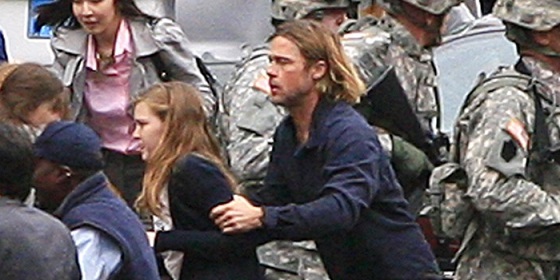Ken Burns’s World War Z?

 In 2003, Max Brooks published the New York Times bestseller Zombie Survival Guide and subsequently followed it up with World War Z in 2006. In June 2011, filming began of an adaptation of World War Z‘s epic zombie story, and it’s been nothing but trouble ever since. The shoot was plagued by humiliations, release delays, reshoots, rewrites, criticized CGI, and fan complaints about how the movie’s story bears little resemblance to the novel’s. The story is currently more about one man’s race against time to save the world than about surviving a plague or zombies, which fans couldn’t help but find less intriguing than the book even though the movie stars Brad Pitt.
In 2003, Max Brooks published the New York Times bestseller Zombie Survival Guide and subsequently followed it up with World War Z in 2006. In June 2011, filming began of an adaptation of World War Z‘s epic zombie story, and it’s been nothing but trouble ever since. The shoot was plagued by humiliations, release delays, reshoots, rewrites, criticized CGI, and fan complaints about how the movie’s story bears little resemblance to the novel’s. The story is currently more about one man’s race against time to save the world than about surviving a plague or zombies, which fans couldn’t help but find less intriguing than the book even though the movie stars Brad Pitt.
Also working against the project as it stands is that in the time between 2006 and 2013, there was plenty of time for the zombie market to get saturated as hell and for the sight of a wave of the reanimated either shuffling or running at people to become tired. It’s not just numerous straight zombie stories like 28 Weeks Later, the Rec series and the Resident Evil one, the games Day Z and Dead Island, the TV series The Walking Dead, etc. They’ve been deconstructed and parodied with films like Zombieland, Warm Bodies, or Cabin in The Woods, seemingly the public’s way of saying that they’re a bit sick of the genre.

This unpleasant situation could have been avoided with a very simple tactic: actually adapting the story as it’s laid out in the book. World War Z isn’t an action book: it’s a collection of interviews from survivors of the apocalypse of the undead. Because of the extreme diversity of persons involved, numerous perspectives of the type not often seen in this sort of story are presented, such as Chinese civilians, American mercenaries, Russian soldiers, etc. Better still is that it allowed just enough realistic flavor to get into the story that it became more believable without becoming boring or making the absurdity of reanimated corpses ending civilization as we know it overbearing. This is the reason why even literary critics clearly contemptuous of the genre referred to it as “smarter than it has any right to be.”
Is the suggestion here that World War Z should have been a documentary in the style of Ken Burns? Should it have been a collection of interviews in a style often referred to as “talking heads” inter-cut with stills or archival footage? Not necessarily, but it certainly could have been used as an effective reference point for how to execute this story in a way true to the spirit of the book and whose fans you certainly want to be in favor of your movie.
If you think that audiences are only interested in spectacle and that such a telling wouldn’t appeal to the “lowest common denominator,” consider the huge financial successes of District 9, The Blair Witch Project, or The Fighter. These films among other high-grossing docudramas such as The Social Network or 127 Hours indicate that audiences are opening up to these new formats to a greater extent than ever before, and the critical respect they got was through the roof.

You gotta admit, it’s not the most obvious thing to put in a zombie movie.
This would have surely kept costs down and allowed more room for actors to build their characters by doing interview monologues than just following Pitt as he tries to prevent a pandemic. Imagine the number of unique, viral video clips that could be generated from taking such interview clips and putting them online versus basically only garnering interest in the movie’s trailer. Definitely it wouldn’t have become the high-profile flop World War Z has been projected to become.
Or maybe the movie will be better than anticipated and be a big hit. While many are skeptical that will be the case, there’s no point to being bitter about it and rooting against the movie’s success. Hopefully, though, some future filmmaker will give this novel alternative a try.











